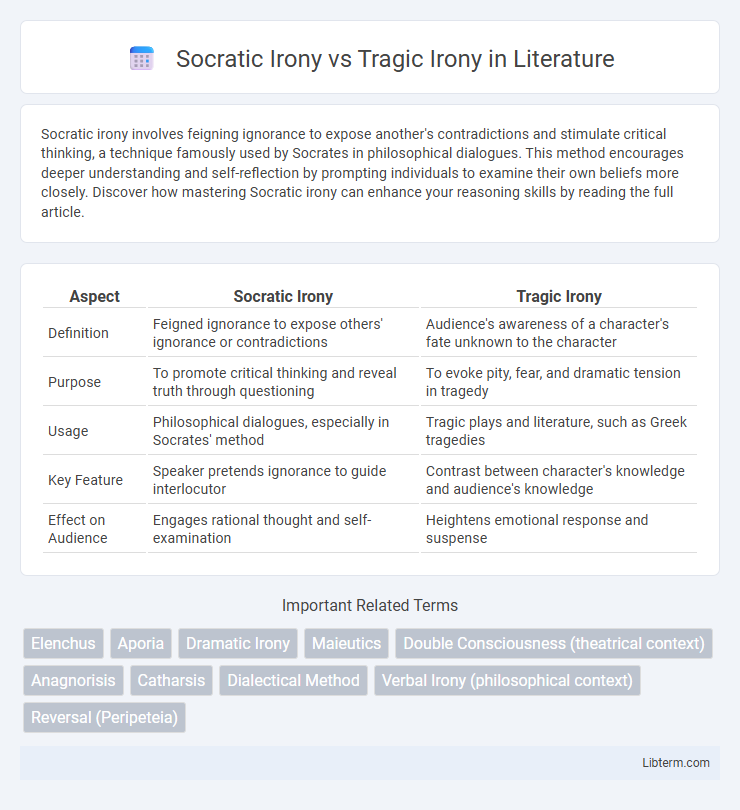Socratic irony involves feigning ignorance to expose another's contradictions and stimulate critical thinking, a technique famously used by Socrates in philosophical dialogues. This method encourages deeper understanding and self-reflection by prompting individuals to examine their own beliefs more closely. Discover how mastering Socratic irony can enhance your reasoning skills by reading the full article.
Table of Comparison
| Aspect | Socratic Irony | Tragic Irony |
|---|---|---|
| Definition | Feigned ignorance to expose others' ignorance or contradictions | Audience's awareness of a character's fate unknown to the character |
| Purpose | To promote critical thinking and reveal truth through questioning | To evoke pity, fear, and dramatic tension in tragedy |
| Usage | Philosophical dialogues, especially in Socrates' method | Tragic plays and literature, such as Greek tragedies |
| Key Feature | Speaker pretends ignorance to guide interlocutor | Contrast between character's knowledge and audience's knowledge |
| Effect on Audience | Engages rational thought and self-examination | Heightens emotional response and suspense |
Introduction to Socratic and Tragic Irony
Socratic irony involves a speaker pretending ignorance to expose another's ignorance or stimulate critical thinking, commonly seen in dialogues by Socrates. Tragic irony occurs when an audience knows crucial information that characters do not, creating tension as characters' actions lead to inevitable, often disastrous outcomes. Both forms of irony engage the audience by highlighting contrasts between knowledge and belief, but Socratic irony aims to encourage reflection while tragic irony emphasizes fatal misunderstandings.
Defining Socratic Irony
Socratic irony is a rhetorical technique used by Socrates, where he pretends ignorance to expose contradictions in others' arguments and stimulate critical thinking. This form of irony emphasizes the speaker's feigned knowledge gap to encourage dialogue and self-reflection. In contrast, tragic irony occurs when the audience knows a character's fate while the character remains unaware, creating dramatic tension rather than a method for intellectual discovery.
Defining Tragic Irony
Tragic irony occurs when the audience possesses knowledge that the characters do not, leading to a profound sense of impending doom as the characters unknowingly make decisions that bring about their downfall. This form of irony is central to classical tragedies, where the protagonist's fate is sealed by a combination of ignorance and unavoidable destiny. Unlike Socratic irony, which involves feigned ignorance to expose others' ignorance, tragic irony emphasizes the gap between perception and reality, heightening emotional impact and dramatic tension.
Historical Origins and Contexts
Socratic irony originates from ancient Greece, specifically linked to the philosopher Socrates, who used it as a pedagogical method of pretending ignorance to expose contradictions in others' beliefs during dialogues in the 5th century BCE. Tragic irony, rooted in classical Greek tragedy, emerged in the theatrical works of playwrights like Sophocles and Euripides, where characters face destiny with dramatic knowledge that the audience possesses but the characters lack, intensifying the sense of inevitable downfall. Both forms of irony reflect different historical contexts: Socratic irony serves philosophical inquiry and ethical examination, while tragic irony enhances emotional impact and moral lessons within dramatic narratives.
Key Characteristics of Socratic Irony
Socratic irony is characterized by a person pretending ignorance to expose others' ignorance or flaws in their arguments, often used as a pedagogical tool in philosophical dialogues. It involves asking seemingly naive questions to stimulate critical thinking and reveal contradictions without overt confrontation. Unlike tragic irony, which arises from dramatic tension and audience knowledge exceeding the characters', Socratic irony is a deliberate method of inquiry emphasizing humility and intellectual rigor.
Key Characteristics of Tragic Irony
Tragic irony centers on a protagonist's ignorance of a critical truth that the audience fully understands, leading to inevitable suffering or downfall. Key characteristics include dramatic tension created by this disparity in knowledge, a sense of impending doom, and the elicitation of pity or fear in the audience. Unlike Socratic irony, which uses feigned ignorance to expose contradictions, tragic irony evokes emotional engagement through the protagonist's tragic fate.
Socratic Irony in Philosophical Dialogue
Socratic irony, prevalent in philosophical dialogue, involves a speaker feigning ignorance to expose another's ignorance and stimulate critical thinking, as seen in Plato's works. This method contrasts with tragic irony, where the audience knows a character's hidden fate, creating dramatic tension. Socratic irony effectively challenges assumptions and guides interlocutors toward self-discovery and truth.
Tragic Irony in Classical Literature
Tragic irony in classical literature often unfolds when a protagonist's fate is starkly at odds with their understanding of their circumstances, as seen in Sophocles' "Oedipus Rex," where Oedipus unknowingly fulfills a devastating prophecy. This form of irony emphasizes the inevitable downfall caused by human limitations and fate, heightening emotional impact and philosophical reflection. Unlike Socratic irony, which involves feigned ignorance to expose ignorance or provoke insight, tragic irony centers on dramatic tension and the tragic consequences of characters' blind spots.
Comparative Analysis: Socratic Irony vs Tragic Irony
Socratic irony involves a speaker pretending ignorance to expose others' contradictions and stimulate critical thinking, often used in philosophical dialogues. Tragic irony occurs when the audience knows crucial information unknown to the characters, leading to inevitable suffering or downfall in literary tragedies. While Socratic irony promotes intellectual discovery and clarity, tragic irony highlights human vulnerability and fate, contrasting their functions in narrative and discourse.
Lasting Impact and Contemporary Relevance
Socratic irony's lasting impact lies in its foundational role in critical thinking and pedagogy, fostering self-awareness and intellectual humility through questioning assumed knowledge. Tragic irony, rooted in classical literature, continues to influence storytelling by highlighting human vulnerability and fate, shaping modern narratives' emotional depth. Both forms remain relevant in contemporary discourse, with Socratic irony driving analytical dialogue and tragic irony enhancing empathy and moral reflection in media and literature.
Socratic Irony Infographic

 libterm.com
libterm.com